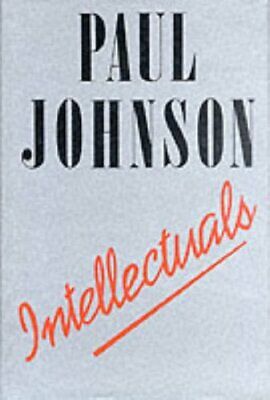The book Paul Johnson may best be known for is Intellectuals, an essay collection highly critical of many of the “great men” of intellectual history. Birth of the Modern, the first Johnson book I read, was also skeptical of the bright lights of European intellectualism, but Intellectuals is where he concentrated on the biographical details of many of them. Ed West selected some of Johnson’s essay on Jean-Jacques Rousseau as part of his obituary post:
… Johnson is best known to many for his history books, one of the most entertaining being Intellectuals. Published in 1989 and structured as a series of – very critical – biographies of great philosophers, poets, playwrights and novelists, Johnson’s book got to the essence of the intellectual mindset in all its worst aspects: their intense selfishness and narcissism, their callousness towards friends and lovers, and their fondness for giving moral support to some of the worst ideas and regimes in history.
One of the most prominent Catholics in British journalism, Johnson saw secular intellectuals as modern successors to the theologians of the medieval Church, the difference being that, without the restraints of religious institutions, their egotism was uncontrolled.
Writers and artists are often incredibly selfish people, and this is true across the political spectrum, but of course it’s far more satisfying to read about those men who claimed to be the saviour of the poor and humble yet were so relentlessly horrible to actual people around them. That’s what makes the book – published just as the system imagined by one of its subjects came crashing down in eastern Europe – so satisfying.
One of the targets, er, I mean “subjects” of Intellectuals was Jean-Jacques Rousseau, who was quite the piece of work indeed:
It begins with Jean-Jacques Rousseau, the “first of the modern intellectuals” and perhaps the subject of Johnson’s most intense vitriol.
“Older men like Voltaire had started the work of demolishing the altars and enthroning reason,” he wrote: “But Rousseau was the first to combine all the salient characteristics of the modern Promethean: the assertion of his right to reject the existing order in its entirety; confidence in his capacity to refashion it from the bottom in accordance with principles of his own devising belief that this could be achieved by the political process; and, not least, recognition of the huge part instinct, intuition and impulse play in human conduct.
“He believed he had a unique love for humanity and had been endowed with unprecedented gifts and insights to increase its felicity.” He was also an appalling human being.
[…]
Madame Louise d’Épinay, a lover who he treated terribly, said “I still feel moved by the simple and original way in which he recounted his misfortunes”. Another mistress, Madame de Warens, effectively supported him in hard times but, when she fell into destitution, he did nothing to prevent her dying of malnutrition.
Rousseau had a “pseudo-wedding” with his mistress Therese Levasseur where he gave a speech about himself, saying there would be statues erected to him one day and “it will then be no empty honour to have been a friend of Jean-Jacques Rousseau”. He later accused her brother of stealing his 42 fine shirts and when he had guests for dinner she was not allowed to sit down. He praised her as “a simple girl without flirtatiousness”, “timorous and easily dominated”.This easily-dominated woman gave birth to five of his children, whom he had sent to an orphanage where two-thirds of babies died within the first year and just one in 20 reached adulthood, usually becoming beggars. He made almost no attempt to ever track them down, and said having children was “an inconvenience”.
“How could I achieve the tranquillity of mind necessary for my work, my garret filled with domestic cares and the noise of children?” He would have been forced to do degrading work “to all those infamous acts which fill me with such justified horror”.
He was spared that horror and instead given time to develop his ideas, which were fashionable, attractive and completely unworkable. “The fruits of the earth belong to us all, the earth itself to none”, he said, and hoped that “the rich and the privileged would be replaced by the state which reflected the general will”.
What would this mean in practice? “The people making laws for itself cannot be unjust … The general will is always righteous”.
Despite his ideas veering between woeful naivety and sinister authoritarianism, they proved hugely popular, especially with the men and women who in 1789, just a decade after his death, would bring France’s old regime crashing down — with horrific consequences. As Thomas Carlyle famously said of Rousseau’s The Social Contract: “The second edition was bound in the skins of those who had laughed at the first.”
Rousseau was perhaps the most influential figure of the modern era. In particular his rejection of original sin would become far more popular in the late 20th century; indeed it is at the core of what we call the culture war, and its fundamental conflict over human nature.




